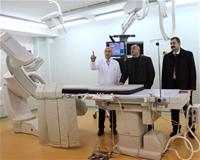Expensive healthcare - real disease
Ralitsa Kovacheva, March 11, 2010
 With untypical haste and consistency the Bulgarian government realised its promise to increase the healthcare security by 2% (from 8% now, to 10%) as of April 1st. The increase will be shared 60:40 between the employer and the worker. The cabinet defended the increase, outlining the necessity to "inject" urgently 300 mn levs (153 mn euro) in the budget of the National Healthcare Agency.
With untypical haste and consistency the Bulgarian government realised its promise to increase the healthcare security by 2% (from 8% now, to 10%) as of April 1st. The increase will be shared 60:40 between the employer and the worker. The cabinet defended the increase, outlining the necessity to "inject" urgently 300 mn levs (153 mn euro) in the budget of the National Healthcare Agency.
The finance minister Simeon Dyankov defined the decision as a difficult and unpopular but the only possible one. He also said that this decision was caused by great impatience of patients and workers in the healthcare system to see the results of the reform. "It is not worth playing with people's health, with people's feelings and wait for better revenues in the end of the year. Any other step leads to Greece and Romania", Dyankov stated.
Zornitsa Slavova from the Institute for Market Economy commented for euinside:
"The increase of healthcare security by 2% is economically ill-founded as a way to compensate the ineffectiveness of Bulgaria's healthcare system. This is unexplainable for people as well, because they will not get anything in exchange to higher securities. The increase of social burden would have several significant consequences: a larger exodus from healthcare payments, contraction of economic activity, reduction of incomes, increase of unemployment in the country.
The hole in the budget of the National Healthcare Agency can be filled in by reducing government's spending (cuts of unnecessary payments, state's withdrawal from unusual activities, privatisation), and not by additional social security burden for citizens and business. Either way, money in unreformed sectors should not be poured. Instead, swift actions to unmonopolise the Agency are needed, equal participation of private sector in providing healthcare, introduction of personal health accounts, hospitals privatisation as well".
Here we have to recall that the government promised fast reforms in healthcare (by allowing private healthcare funds, closure of hospitals), which so far have not been realised.
The healthcare securities increase would lead to general growth in taxation in Bulgaria (the share of taxes and social securities in the labour spending of employers), Gheorghi Stoev from the Industry Watch said. With 8 per cent healthcare payment, this burden is 32.3% for salaries up to 2,000 levs (1,025 euro), but with the increase it would jump to 33.6%. Regarding the rumours that the government is considering increasing the flat tax from 10 to 12 per cent, Gheorghi Stoev calculated that then the tax burden would jump to 35.1%. To put it more simply, if a worker wants to take 500 levs home (256 euro), his employer should make 770 levs expenditure (358 euro).
The UDF leader (Union of Democratic Forces, sometimes supporting the government) Martin Dimitrov also denounced the increase during a crisis, saying this would not bring more revenues to the budget. In an interview he added that there was money for healthcare, therefore there was no point in increasing the securities. He also reminded that the ruling party GERB was not complying with its own pre- election promises, one of which was decrease of social securities burden. "Our analytical department says that probably the budgetary deficit in the end of February would be over 1 bn levs (510 mn euro)", Dimitrov said and called for quick measures and overall strategies.
Unless the government presents its own action programme against the crisis, we are headed towards Greece, the co-president of the opposition Blue Coalition Ivan Kostov (a former finance minister and prime minister for the period 1997-2001) said in Parliament.
According to the liberal party NDSV, the increase of securities and taxes during a crisis would destroy part of the business and would lead to even greater difficulties for the budget and the social funds. NDSV reminded the government and the Parliament, that healthcare security was already increased by 2% a little less than a year ago, without the necessary unmonopolisation and reform of the healthcare system.
The changes the government proposed must be approved by the National Parliament so as to come into force.
*On the photo you can see the prime minister Boyko Borisov and the minister of healthcare Bozhidar Nanev. Both of them did not dare defend the changes before the media.